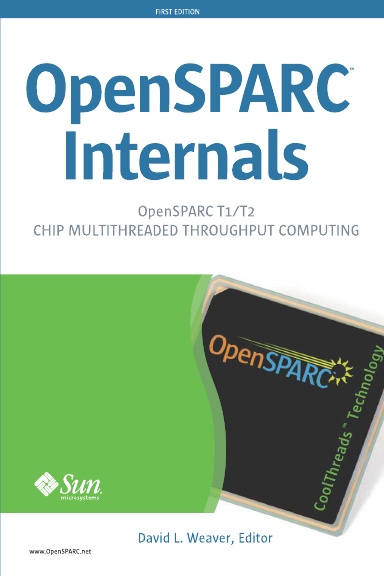Just heard that my talk is moving to the Nikko Ballroom I. Still at 4pm Monday.
Thursday, September 16, 2010
Details for Oracle Open World Presentation
I'm presenting at the Develop conference in San Francisco next week. I'll be in the Nikko Ballroom I at the Hotel Nikko, at 4pm on Monday. The title of the talk is "Multicore Application Programming with Oracle Solaris Studio 12.2". The abstract is:
Writing correct and fast parallel applications is often considered a hard problem. However, it doesn't need to be that way. This session will describe how Oracle Solaris Studio can be used to produce applications that are both fast and correct. The talk will cover parallelization strategies, implementation details, and common pitfalls, as well as describing how the tools provided by Oracle Solaris Studio can identify coding errors and performance opportunities in the application.
There's three talks from the Studio team, details are:
| Date | Details | Location |
|---|---|---|
| Monday 20th 4:00pm | S317573: Multicore Application Programming with Oracle Solaris Studio Darryl Gove | Hotel Nikko, Nikko Ballroom I |
| Tuesday 21st 11:30am | S317590: Performance Measurement with Oracle Solaris Studio Performance Tools Marty Itzkowitz | Hotel Nikko, Peninsula |
| Wednesday 22nd 1:00pm | S317585: Building High-Quality C/C++ Applications Don Kretsch | Hotel Nikko, Nikko Ballroom II |
There appears to be no way to link directly to the talk details, but they are available if you search the entire programme.
Friday, September 10, 2010
Book update
I've just handed over the final set of edits to the manuscript. These are edits to the laid-out pages. Some are those last few grammatical errors you only catch after reading a sentence twenty times. Others are tweaks to the figures. There's still a fair amount of production work to do, but my final input will be a review of the indexing - probably next week.
So it's probably a good time to talk about the cover. This is a picture that my wife took last year. It's a picture of the globe at the cliff tops at Durlston Head near Swanage in England. It's 40 tonnes and over 100 years old. It's also surrounded by stone tablets some containing contemporary educational information, and a couple of blank ones that are there just so people can draw on them.
Thursday, September 9, 2010
Linux and Solaris command comparison
This page contains a useful comparison of Solaris and Linux commands.
Wednesday, September 8, 2010
Oracle Solaris Studio 12.2 released
It's been just over a year since the release of Studio 12 Update 1, today we releasing the first Oracle branded Studio release - Oracle Solaris Studio 12.2. For the previous release I wrote a post for the AMD site looking at the growth in multicore processors. It seemed appropriate to take another look at this.
The graph in the chart below shows the cumulative number of SPECint2006 results broken down by the number of cores for each processor. This data does not represent the number of different types of processor that are available, since the same processor can be used in many different results. It is closer to a snapshot of how the market for multicore processors is growing. Each data point represents a system, so the curve approximates the number of different systems that are being released.
It's perhaps more dramatic to demonstrate the change using a stacked area chart. The chart perhaps overplays the number of single core results, but this is probably fair as "single core" represents pretty much all the results prior to the launch of CPU2006. So what is readily apparent is the rapid decline in the number of single core results, the spread of dual, and then quad core. It's also interesting to note the beginning of a spread of more than quad core chips.
If we look at what is happening with multicore processors in the context of what we are releasing with Solaris Studio, there's a very nice fit of features. We continue to refine our support for OpenMP and automatic parallelisation. We've been providing data race (and deadlock) detection through the Thread Analyzer for a couple of releases. The debugger and the performance analyzer have been fine with threads for a long time. The performance analyzer has the time line view which is wonderful for examining multithreaded (or multiprocess) applications.
In addition to these fundamentals Studio 12.2 introduces a bunch of new features. I discussed some of these when the express release came out:
- For those who use the IDE, integration of support for the analysis of the runtime behaviour of applications has been very useful. It both provides more information directly back to the developer, and raises awareness of the available tools.
- Understanding call trees is often an important part of interpreting the performance of the application. Being able to drill down the call tree has been a very useful extension to the Performance Analyzer.
- Memory error checking is critical for all applications. The trouble with memory access errors is that, like data races, the "problem" is visible arbitrarily far from the point where the error occurred.
The release of a new version of a product is always an exciting time. It's a culmination of a huge amount of analysis, development, and testing, and it's wonderful to finally see it available for others to use. So download it and let us know what you think!
Footnote: SPEC, SPECint, reg tm of Standard Performance Evaluation Corporation. Results from www.spec.org as of 6 September 2010 and this report.
Parallelisation white paper
An interesting white paper on various approaches to writing parallel programs has just been released. Covers OpenMP, Threading Building Blocks, MPI, and a bunch of others.



